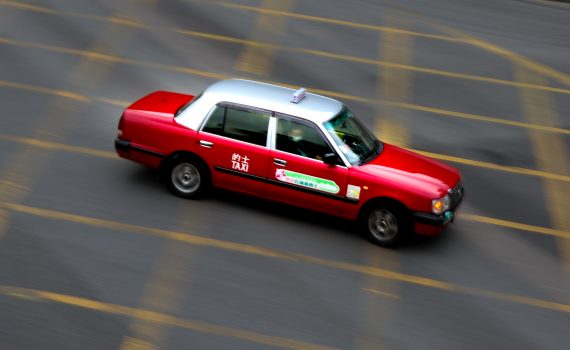Society
Shift in news consumption habits gives rise to donation-based revenue model
- 2025-02-19
- Society
- The Young Reporter
- By: AU YEUNG Jim、YAM Long Hei JamieEdited by: NG Natasha Goa Sheng
- 2025-02-19
Tang Ho-wing, 36, is an independent journalist running the news outlet, “boomheadhk”, on social media platforms such as Facebook and Instagram. The page mostly covers local and international political issues, and has attracted over 22,700 followers. “Hongkongers' news consumption habits have shifted. Increasingly, they want to consume content not covered by the mainstream media or specialised content that features unique views,” Tang said. The main purpose of his outlet is to supplement the mainstream media and offer readers new insights on social issues. Tang’s outlet relies on readers’ donations to cover the cost of his reporting work. “When people want to read more specialised and unique reporting, or lesser-known content, they are willing to pay,” Tang said. According to Reuters Institute Digital News Report, in an online survey of 2,000 respondents in Hong Kong, only 18% said they pay to access news online in 2024, down from the peak of 29% in 2020. The report added that because the public’s news consumption habits have changed and advertising revenue has declined, media organisations that struggle in adapting to the rapid change have reported financial losses. Hong Kong Free Press, an independent non-profit news media that relies on readers’ donations, reported a HK$1.4 million loss in 2023, according to its annual report. HKFP has 895 regular monthly donors as of 2023. Damon Wong Chun-pong, Chief Editor of InMedia, a local online independent news outlet, said his outlet did not experience significant financial losses. “The drop in paid readership following 2020 is a full picture that includes the closure of mainstream media outlets, such as Apple Daily and Stand News,” said Wong. “By comparison, our readership didn’t drop a lot.” He said some readers follow other small and new news outlets after some closure of some of the mainstream outlets. The newcomers include …
Taxi industry demands for consummate policy under threats in hailing car ecology
- 2025-02-18
- Society
- By: Chun Lim LEUNG、Chun Hei LUKEdited by: CHEN Yik Nam
- 2025-02-18
A 17% rise from the second to third quarter last year on passenger complaints of taxi driver’s behavior among taxi industry, highlighting a growing crisis in trust among commuters. Tseng Wing-tong, 28, a local teacher, expressed her dismay over the degrading image of traditional taxis in the city. She had a harrowing experience with a taxi, where the driver was "recklessly" running through traffic and flouting basic safety rules. "I was literally scared for my safety," she said. "The image of taxis here has taken a hit," Tseng said, reflecting on a widespread perception of poor service and unclean vehicles. “If traditional taxis want to compete, better driver training and better maintenance of vehicles are needed so that people can get back into a place of trust,” she added. Based on the Transport Complaints Unit, the number of overcharging cases increased from 11 in 2021 to 42 in 2023. Cases of refusals to take passengers or to drive to specified destinations leapt from 27 in 2021 to 85 by 2023, a 214% increase. The number of complaints has remained fairly stable, in the region of 11 to 13 annually. After online-based ride-hailing platforms like Uber became popular, local taxis have been getting fewer and fewer attention. The official Uber Newsroom’s research shows that 60% of passengers said that Uber Taxi is the safest choice for sorting good taxi drivers. Kwong Ka-chun, 42, a red taxi driver, said that much stricter regulations or better training programmes are needed to restore public trust in the taxi industry. "The main reason for the negative perception is definitely the bad behaviour of some drivers,” he said. “I've witnessed colleagues refuse to take passengers because the fare isn't high enough.” Kwong remembered the day when one passenger refused to get in his taxi because she …
Golden Horse Film Awards Best Actress Chung Suet-ying shares career experiences at her alma mater
- 2025-02-17
- Society
- The Young Reporter
- By: QIN Ziyang、XU JingyiEdited by: AO Wei Ying Vinci
- 2025-02-17
Golden Horse Film Awards Best Actress, Chung Suet-ying of the film The Way We Talk returned to her alma mater, Hong Kong Baptist University, to share her career experiences with journalism students on Friday. Chung played Sophie Fong in The Way We Talk, an optimistic deaf girl who faces difficulties in life but tries to be seen as “normal”. She won best actress at the 61st Golden Horse Awards and was nominated best actress for the 43rd Hong Kong Film Awards. Chung was a graduate of the financial journalism stream at the School of Communication. She said that the Journalism Department enhanced her nosy and curious nature.“Being nosy is not shameful, but a way to absorb knowledge and enjoy learning, just like reading and asking questions,” she said. She added that what’s common between journalism and movies is that they're both about stories. “I can extract the ideas from stories told by others, and convert them to become my motivation,” Chung said. “I think it's amazing that she went from financial journalism to acting. Everyone has their own path to success, and I believe her experience will also inspire my future career planning,” said Zhang Jiahe, a freshman at Hong Kong Baptist University, who aims to study financial journalism in the future. Chung first became a disc jockey after graduation. After that, she was in several on-screen performances, including films, TV series and music videos.In Time, she played Wat Tsz-ying, and she was nominated 40th Hong Kong Film Awards best supporting actress for her debut performance in a feature-length film. In The Lyricist Wannabe, she was the female-lead, and was nominated for the 60th Golden Horse Film Awards for best actress. She also wrote song lyrics for singers such as Eason Chan, Jace Chan and Kaho Hung. Many students were …
ADHD Challenges and Support in Hong Kong
- 2025-02-17
- Society
- The Young Reporter
- By: Wing Chi HO、Chun Lim LEUNGEdited by: Wai Yan MIU
- 2025-02-17
There were 5%-9% of children in Hong Kong suffering from Attention Deficit Hyperactivity Disorder, according to Castle Peak Hospital. Parents face difficulties in caretaking roles, while organizations like the Hong Kong Association for AD/ HD have offered consultations and workshops to release the pressure on caretakers as well as patients. Reported byWing Chi HO and Chun Lim Leung Edited by Vivian Miu and Jeffrey Chan
Giant Panda Twin Cubs 100 Days Celebration
- 2025-02-17
- Society
- The Young Reporter
- By: Wing Chi HO、Chun Lim LEUNGEdited by: Sze Kei WONG
- 2025-02-17
Hong Kong's first locally born pandas cubs turned 100 days old on Saturday at Ocean Park, which drew more than 16,000 to its birthday celebrations. Panda twins’ father Le Le also made an appearance for the first time in two months. Reported by : Chun Lim LEUNG、Wing Chi HO Edited by: Sze Kei WONG
Meet Hong Kong-born Giant Panda Twin Cubs
- 2025-02-17
- Society
- The Young Reporter
- By: Wing Chi HO、ALISHIBA MATLOOBEdited by: Chun Lim LEUNG
- 2025-02-17
Giant Panda twin cubs meet the media at Hong Kong Ocean Park ahead of their public debut on Sunday (February 16). Reporter: Wing Chi HO, Alishiba-Matloob Editor: Chun Lim LEUNG
Remade vintage sparks sustainable fashion trend
- 2025-02-17
- Society
- The Young Reporter
- By: LAU Ka Yan、CHAN Hiu YingEdited by: LI Sin Tung
- 2025-02-17
Crowds of shoppers, most of them young, pack into the narrow corridors on the 15th floor of Ho King Commercial Centre in Mong Kok, especially on the weekends and during holidays. They are drawn to the remade vintage clothes and accessories at CheckThis. The owner, Mic Chung, 25, designs the products. “I found some remade items while traveling in Japan and Thailand. At that time, remade vintage clothes or accessories were still not popular in Hong Kong, so I thought it was a potential market I could work for,” she said. Remade vintage is one of the practices of upcycling, where second-hand clothing is collected and different fabrics are patched together to create unique pieces. The emphasis is on sustainability and waste-reduction. In Hong Kong, remade vintage fashion is gaining momentum as young shoppers increasingly seek sustainable alternatives to fast fashion. Stores including CheckThis and Redress offer remade clothing that blends unique designs with environmental consciousness. CheckThis uses Instagram to engage with customers and employs marketing tactics like lucky bags or holiday discounts to attract consumption. “I am glad that the shop has become more and more popular among younger consumers, and I can feel that people are becoming increasingly aware of the need to protect the environment,” Chung said. Chung said vintage is not new, so the products and designs must be relatively rare in order to attract customers. “Compared to the affordability promoted by fast-fashion brands, vintage offers the uniqueness that consumers value more today,” she said. Gary Tsang, a member of the Hong Kong Fashion Designer Association, said that amid the rise of Y2K and Y3K trends, more young customers prefer upcycling or other sustainable alternatives to fast fashion. Y2K fashion responds to novelty with a futuristic retro vibe, focusing on bright colours. Y3K goes further, aiming …
Flowers bloom on Valentine’s Day, but not the sales
- 2025-02-17
- Society
- The Young Reporter
- By: CHAU Wing YauEdited by: ZHANG Yiping
- 2025-02-17
Flowers sales for Valentine’s Day fell short of expectations, as florists at Mong Kong Flower Market reported a decrease in sales compared to last year. With roses, sunflowers and white gypsophila decorating the streets, the Mong Kok Flower Market, a well-known area for buying flowers and plants, was crowded with people on Valentine's Day. However, sales were not ideal for florists. Chris Ng, who is in her thirties and working in a flower shop called “Floralwords”, said that the sales were 30% less than last year. “Only around 80 bouquets have been ordered so far,” said Ng. “The economy is worse right now, so our store did not raise prices for Valentine’s Day.” The price for a bouquet of 20 roses at their store was HK$880. Rex Cheung, who works at Some Flower in Mong Kok, also reported a 30% sales decrease compared with last year. “There were only around 10 customers who bought flowers the day before Valentine’s Day, and the customer flow is even worse on Valentine’s Day,” said Cheung. Cheung agreed with Ng that the decline in flower sales is related to the sluggish performance of the Hong Kong economy. “The economy is poor this year, so cost has become a concern of customers,” he added. Brandon Qin, a 19-year-old secondary student, bought his girlfriend a bouquet in a Mong Kok flower shop. “I bought this for around HK$30, which is a bargain for Valentine’s Day,” said Qin. “But if I have time, I will buy flowers in Shenzhen,” Qin added. “The flowers in Shenzhen are less expensive. Flowers at HK$300 in Hong Kong may only be 200 yuan (HK$215) in Shenzhen, so it is more affordable.” In a bid to increase sales, flower shops came up with various marketing strategies. Some of them made romantic quotes …
More pedestrian-oriented elements appear on the roads
- 2025-02-13
- Society
- The Young Reporter
- By: WANG JingEdited by: CAO Jiawen
- 2025-02-13
Chole Lau, 32, never thought she would receive a court summons. But on her way to lunch this June, she had crossed the street at a red light to save her precious lunch break. The police officer gave her a ticket for jaywalking on the spot. Two weeks later, she received a summons from the court. Lau sent a written plea of guilty to the charges, then received a notice to pay a fine of HK$300 a few days later, finally ending this matter. “It’s the first summons I received in my life,” Lau said. “I thought I would just get a ticket, but I didn't expect to receive a court summons.” Now, with traffic accidents involving pedestrian injuries and deaths rising 12% in 2023, according to police statistics, the police hope to strengthen public awareness of pedestrian safety through a crackdown on people who break the traffic rules, such as Lau. But Justin Yim, the founder of Street Reset, an organization calling for street design changes in Hong Kong, said that the widespread phenomenon of “jaywalking” reflects the discrepancy between pedestrians' needs and the road design of Hong Kong. According to the 2015 Road Safety Council Annual Report, the Road Safety Council began to develop new platforms to highlight the most pressing road safety concerns. From 2015 to 2022, pedestrian casualties decreased for most age groups compared to 2010-2014, except for a 37.1% rise in the 65 to 69 age group, according to the Hong Kong Traffic Injury Collision Database. In 2019, there was a research on pedestrian crossing and the presence of a bridge in Mong Kok which was conducted by Gianni Talamini, an associate professor of the Department of Architecture and Civil Engineering at the City University of Hong Kong. Talamini found that the elderly usually avoid …
Young cosplayers in Hong Kong turn passion into profit as 'cosplay commissions' provide emotional fulfillment for fans
- 2025-02-12
- Society
- The Young Reporter
- By: WANG LudanEdited by: YANG Haicen
- 2025-02-12
Leslie Cheng, an 18-year-old cosplay enthusiast, transformed into a male anime character from the popular Japanese TV series. She first put in red contact lenses, concealed her long hair under a wig, and slipped height-enhancing insoles into her shoes to make herself 1.77 meters. She was about to go to Mongkok for a date with a woman she had met online less than a month ago. Tonight Cheng will make HK$200. “This is my new side hustle, which we call cosplay commission,” said Cheng.“Through cosplay, we bring characters from anime into reality and go on dates with the character’s female fans.” Cheng is one thousands running cosplayer commission businesses through social media, especially Xiaohongshu and China’s TikTok, which have made their way to Hong Kong. Many young people here say this new job not only brings in extra cash but also a sense of fulfillment for their female clients and themselves. The cosplaying apparel segment dominated the Asia-Pacific role-playing and otaku apparel industry in 2022, valued at US$ 1.5 million, and the segment will likely getting 7.2%, according to market research company Astute Analytica. “I'm happy that more and more people like the service of cos commission,” Cheng said after first posting photos with her clients and receiving many positive comments on Xiaohongshu. A post titled “Daily Life of Maid Rin Matsuoka” on Xiaohongshu has received over 20,000 likes. Some of Rin Matsuoka’s fans asked in the comment section if they could get the poster’s autograph and have an opportunity to date. Rin Matsuoka is a male character from the Japanese sports anime Free!, recognized for his appealing appearance, intelligence, and loyalty to friends, which attracted groups of female fans, according to the Free! Wiki, a character's science fiction website. “I seek a painter to create an anime-style drawing of …










